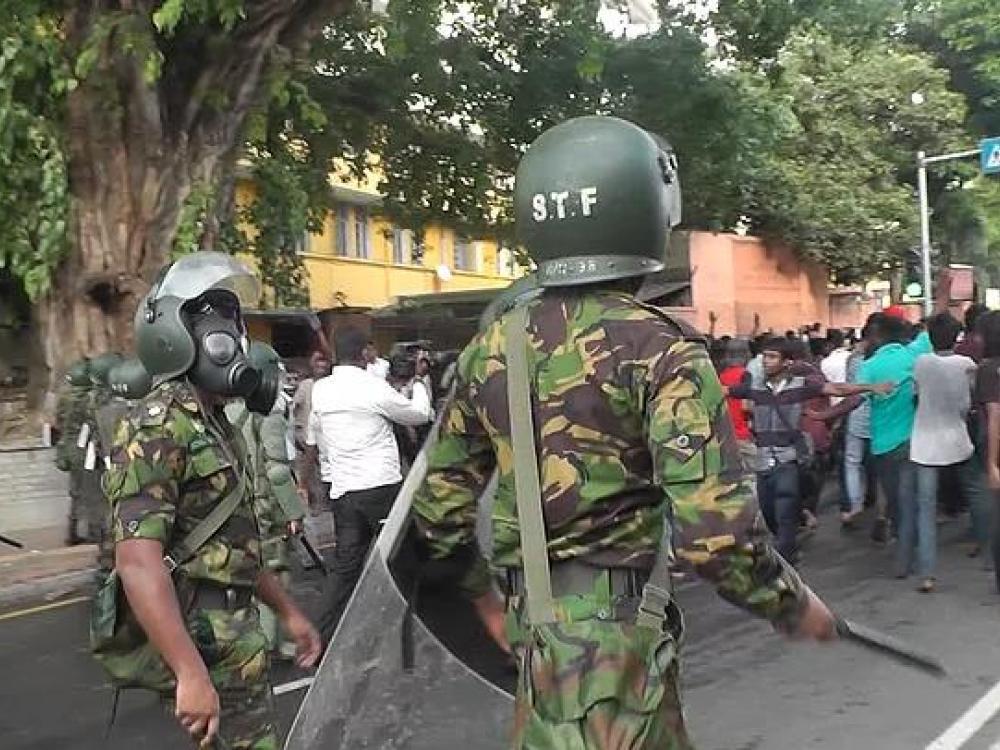
Amidst intense backlash and a damning Human Rights Watch (HRW) report, Police Scotland has temporarily suspended their training of Sri Lankan police officers pending a risk assesment over human rights concerns.
Police Scotland has claimed that they had paused the programme as early as May prior to the requests by HRW for the international partners to suspend engagement with Sri Lanka's police. However, Police Scotland released a press statement just two weeks ago, stating they were "halfway through a three-year programme of work" funded by the British High Commissioner for Colombo.
Earlier this year Police Scotland had defended their training of Sri Lankan police forces with Chief Superintendent, David Duncan, claiming that their approach was is underpinned “by a human rights approach”.
Commenting on the sudden reversal, investigative journalist, Phil Miller told the Tamil Guardian that whilst this was a welcome development, the timing was “slightly surprising”. Miller questions that if the suspension was driven by concern over human rights, why had this not occurred earlier as the relationship, which dates back to 2007, has consistently raised human rights concerns.
“Whether it's Human Rights Watch’s recent report, or the appointment of Hitler admirer, Dilum Amunugama, to Minister of Community Police Services, was beyond the pale for Police Scotland and the Foreign Office is difficult to tell. However, the appointment of Amunugama did occur in May”.
Miller further notes that whilst the programme has been temporarily paused for a risk assessment, “it remains to be seen whether this will be cancelled or if Britain will re-enter an agreement before any genuine political change”.
Read more here: Human Rights Watch urges international partners to suspend engagement with Sri Lanka's police
Lending legitimacy
In their report HRW highlighted the increasing police brutality, detentions, and extra-judicial killings being undertaken by the Sri Lankan police. They further calls on the international community to cease engagement with “abusive Sri Lankan law enforcement”. The report warns international partners that “assistance risks appearing to endorse or lend legitimacy to agencies that are unwilling to improve their respect for human rights”.
“Sri Lanka’s police seem intent on building on their past record of serious abuses, instead of cleaning up their act,” said Meenakshi Ganguly, South Asia director at HRW.
Miller further highlights that whilst the suspension is a positive development, “police training is just one aspect of British policy towards Sri Lanka”.
“There are no signs that Britain will impose sanctions on senior Sri Lankan officials implicated in war crimes and human rights abuses. In contrast, Britain has been willing to impose sanctions on Russian officials” he notes. This statement comes as Tariq Ahmed, Minister of State for South Asia and the Commonwealth, has once again refused to comment on potential sanctions for the Sri Lanka’s army commander and war criminal Shavendra Silva.
Miller also notes that there is more the Foreign Office can do with respect to ending military training and engagement.
Calls to end training
![]()
The suspension of training follows calls from human rights organisations over the years demanding a review of the human rights impact of the programme. Amongst the organisations which spoke out against the training contract are Pax Christi, a Catholic peace charity focusing on human rights in Sri Lanka, Amnesty International, and the Sri Lankan Peace and Justice Campaign.
Numerous UK Parliamentarians had questioned the decision including, Member of Scottish Parliament Neil Findlay who noted that Police Scotland has made almost 100 deployments to Sri Lanka in the past eight years despite increasing concerns over ongoing violence by Sri Lanka’s special forces against the Tamil community.
Read more here: Former Scottish Justice Minister admits to ‘turning a blind eye’ to the training of Sri Lankan forces
Speaking to Phil Miller, former Justice Minister for Scottish Parliament, Kenny Macaskill, admits his regret for turning a ‘blind eye’ to Police Scotland’s training of Sri Lanka’s forces, despite concern over human rights violations.
